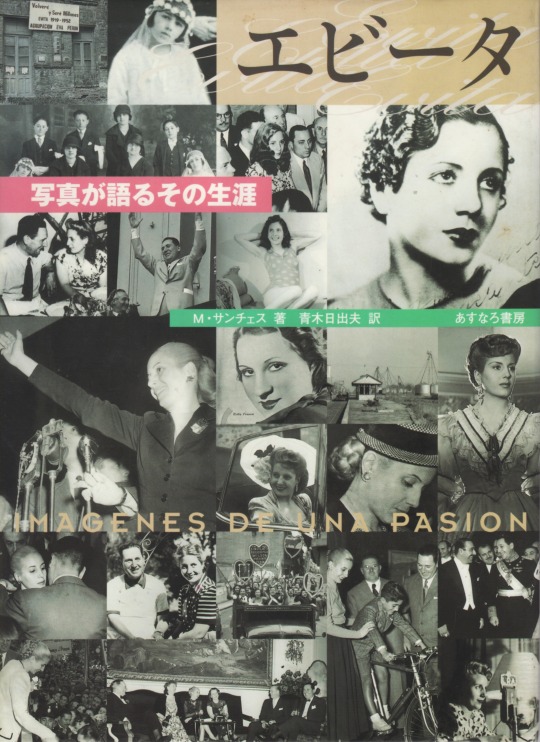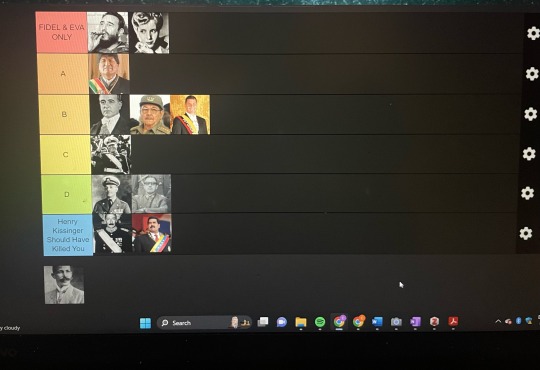#Eva Perón
Explore tagged Tumblr posts
Text









Patti LuPone performing Don’t Cry For Me Argentina!!
Happy Holidays everyone!
I wanted to do another Evita gif set, but I thought doing just one performance would be boring, so I did multiple
and if I was gonna listen to the same song a million times, I was gonna pick a damn good song 🔥🔥🔥🔥
So, enjoy this little set I made!! <33
#patti lupone#evita musical#eva perón#i hate andrew lloyd webber#lesbians for patti lupone#patti lupone 2024#mother#Spotify
62 notes
·
View notes
Text

"Amérique"
Christian Dior Haute Couture Collection Fall/Winter 1950-51. "Ligne Oblique". On the occasion of a gala at the "Teatro Colón" in Buenos Aires, Eva Perón wears "Amérique", an airy evening dress, slightly pink and iridescent like foam. Minimal strapless bodice, wide skirt studded with sequins. Embroidery, tulle by Dognin and Véron.
Christian Dior Collection Haute Couture Automne/Hiver 1950-51. "Ligne Oblique". À l'occasion d'un gala au "Teatro Colón" de Buenos Aires, Eva Perón porte "Amérique", robe du soir aérienne, légèrement rose et irisée comme de l'écume. Corsage minimal sans bretelles, large jupe constellée de paillettes. Broderies, tulles de Dognin et Véron.
#haute couture#christian dior#fashion 50s#1950#fall/winter#automne/hiver#ligne oblique#eva perón#amérique#teatro colón#buenos aires#dognin fabric#véron fabric#vintage fashion#vintage illustration
32 notes
·
View notes
Text
When Gregory Maguire was writing the novel of Wicked, he used Antonio Banderas as his facecast for Fiyero.
Antonio Banderas went on to play Che in the film version of Evita.
The stage musical of Wicked draws parallels between Glinda and Eva Perón as political figureheads: in "Thank Goodness", Glinda wears a 1940s-inspired dress suit and strikes the same pose at a microphone that Eva does in Evita during "Don't Cry For Me, Argentina."
I don't know if the movie Wicked: For Good will highlight Glinda's Eva Perón parallels in the same way. We've already seen photos and a clip from "Thank Goodness," at any rate, and unlike in the stage version, she's not dressed or posed like Eva there.
But regardless, I hope that after its out, some fans make videos of Glinda set to music from Evita, using Antonio Banderas's renditions of the songs. Especially "High Flying Adored," which – with Maguire's facecasting in mind – would come across as Fiyero calling Glinda out on the hollowness of the dream she's achieved.
13 notes
·
View notes
Text

Eva Perón by Annemarie Heinrich, 1944
8 notes
·
View notes
Text
wait, I didn't read the cruel prince, but Jude's mum's name is Eva Duarte? EVA DUARTE? like Eva Duarte the first lady of Argentina, wife of Juan Domingo Perón? did nobody notice this?
I'm sorry, this is news to me and I never saw anyone talking about it
20 notes
·
View notes
Text
Evita Eterna
#a 72 años de su paso a la inmortalidad#Eva Perón#Evita#Maria Eva Duarte de Peron#Eva Peron#Argentina#argieposting
11 notes
·
View notes
Text
Patti LuPone as Eva Perón you will always be famous
10 notes
·
View notes
Text

エビータ-写真が語るその生涯 マティルデ・サンチェス、青木日出夫・訳 あすなろ書房 日本語版ブックデザイン=田辺卓
#IMAGENES DE UNA PASION#エビータ-写真が語るその生涯#エビータ#Evita#Eva Perón#MATILDE SANCHEZ#マティルデ・サンチェス#青木日出夫#田辺卓#anamon#古本屋あなもん#あなもん#book cover
15 notes
·
View notes
Text

This book is the property of Eva Perón, May 2nd 1953.
——
Found in 2023.
(Clearly it doesn’t belong to THE Eva Perón, I just found it amusing)
32 notes
·
View notes
Text

Visita de Eva Perón a Santiago de Compostela en xuño do 1947
7 notes
·
View notes
Text

In 2004 Ethan returned to Evita to perform the role of Che in Bremen.
With Ethan's birthday coming up next month we thought it would be nice to look back on all the incredible roles he has performed over the years.
#ethan freeman#poto#phantom of the opera#european musicals#evita peron#evita musical#eva peron#eva perón#jumblr#jewblr#jewish actors#jewish artist
6 notes
·
View notes
Text
Eva Peron
There’s a working class suburb in the greater Buenos Aires area, Ciudad Evita (Evita City) whch was not only named for Eva Peron, but built to resemble her profile when viewed from the air. Today Ciudad Evita is home to around 70,000 people.
10 things you might not know about Evita:
2 notes
·
View notes
Text

i’m using my collegiate education to make a detailed and historically accurate tier list of notable 20th and 21st century Latin American dictators. there are only 12 squares on the list and two tiers named- we’re looking at least 48 figures to research and assign a tier. wish me luck, recommend some people to cover, and stay tuned
#political science#political history#latin america#latin american history#dictators#dictatorship#latin american dictators#fidel castro#eva perón#augusto pinochet#juan peron#manuel noriega#nicolás maduro#nayib bukele#tier list#im hyperfixating again#special interest#hyperfixation#what am i doing
2 notes
·
View notes
Text

"Ostento dos honores: el amor de mi pueblo, y el odio de los oligarcas”. *A 71 años de la ascensión de Evita
Por Andrés Casciani
Acrílico sobre papel – 21 x 29 cms (2023)
andrescasciani.com
8 notes
·
View notes

